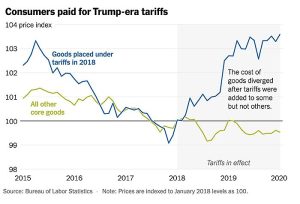Target’s New Policy: Embracing Human Interaction in Retail

A shopper wearing a protective mask pushes a shopping cart at a Target Corp. store in Jersey City, New Jersey, U.S., on Friday, Aug. 14, 2020. Target is scheduled to release earnings figures on August 19. Photographer: Jeenah Moon/Bloomberg via Getty Images
By Michael Reagan with Michael R. Shannon
Saturday, 15 November 2025 05:30 AM EST
Current | Bio | Archive
Just before the “Panicdemic” hit, half of your column writing team decided to move from the Washington, D.C. area to a southeastern state.
Sure, the lack of rush hour traffic and lower gas prices were nice, but in-person shopping was very different.
This was before Walmart invented home delivery of groceries and people still had to visit the store in person.
At our local grocery store, owned by a regional chain, we were being continually startled.
We would be quietly going through our shopping list when shouts of “Hello!” or “Hi, how are you?!” would ring out.
It was all we could do to keep from dropping the list.
The only person we knew was our realro. There was no cause for anyone to be talking to us in the grocery store surrounded by strangers.
And based on our east coast experience, shouting usually preceded a road rage incident, even if it only involved shopping carts.
On the second or third visit we stopped ducking when we realized the folks calling out to us were store employees.
This was unheard of in our experience.
Where we came from customers usually had to set up a perimeter when they saw a store employee to keep them from escaping before you could ask a question.
These southeastern employees greeted you and when you asked for the location of an item, instead of pointing vaguely in the general direction of the parking lot, and mumbling something, they stopped what they were doing and had you follow them to the location of the item.
Naturally, we have been customers ever since.
Minneapolis-based Target has decided there may be something to treating customers like humans instead of mobile wallets just passing through.
The new directive mandating in–store workers smile and make eye contact and either greet or wave to any shopper that comes within 10 feet.
If a customer steps within four feet, then the service rep is instructed to ask whether they need help or how their day is going, the new guidance said.
We are all for being greeted, but we don’t want our interaction with store employees to turn into a counseling session.
“Hi” and “How may I help you?” is plenty.
(The same goes for calling customer service lines regardless of whether the service rep is based in Bangalore or Bangor. We don’t want to discuss our feelings or plans for the weekend.)
Target calls its distance–based human interaction rules the 10-4 program and it’s “the latest effort by management to improve customer experience in the nearly 2,000 Target locations nationwide in the run-up to the holiday season.”
Target’s new hail-f fellow-well-met policy is not just an effort to spread human warmth across the retail aisles.
“Target’s renewed focus on customer experience follows a period of sluggish sales. The retailer reported that comparable sales fell 1.9% year over year in the second quarter of 2025, including a 3.2% drop in-store. Digital sales, however, rose 4.3%.”
We suppose it’s easier to order employees to find their inner Dale Carnegie than it is to blame what’s more responsible for the drop in sales.
We think the drop was caused by Target’s embrace of the child mutilation cult that believes children can swap sexes like they swap best friends forever. When a retailer starts selling “chest binders” and “packing underwear” in the children’s section it can expect some backlash from shoppers who aren’t mentally ill.
We realize it’s hard for a corporation based in Minneapolis to relate to customers who don’t live in Somalia or regularly attend Antifa chapter meetings.
Target’s tentative embrace of America and Americans is a good sign.
Let’s hope welcoming customers as an asset and not an inconvenience spreads throughout the corporate world.
Michael Reagan, the eldest son of President Ronald Reagan, is a Newsmax TV analyst. A syndicated columnist and author, he chairs The Reagan Legacy Foundation. Mr. Reagan is an in-demand speaker with Premiere Speaker’s Bureau. Read Michael Reagan’s Reports — More Here.
Michael R. Shannon is a commentator, researcher for the League of American Voters, and an award-winning political and advertising consultant with nationwide and international experience. He is author of “Conservative Christian’s Guidebook for Living in Secular Times (Now with Added Humor!)” Read Michael Shannon’s Reports — More Here.







